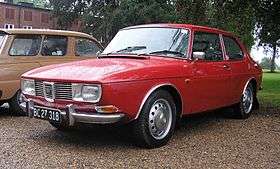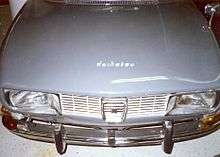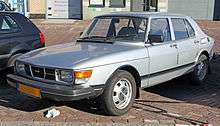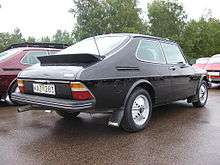Saab 99
| Saab 99 | |
|---|---|
 | |
| Overview | |
| Manufacturer | Saab |
| Production | 1968–1984 |
| Designer | Sixten Sason |
| Body and chassis | |
| Class | Compact executive car (D) |
| Body style |
2-door coupe 3-door combi coupé 4-door saloon |
| Layout | Longitudinal front-engine, front-wheel drive |
| Powertrain | |
| Engine |
1.75 L Slant-4 I4 1.85 L B I4 2.0 L B I4 |
| Transmission |
4-speed manual 5-speed manual 3-speed Borg-Warner automatic |
| Chronology | |
| Predecessor | None |
| Successor |
Saab 90 Saab 900 |
The Saab 99 is a European-manufactured compact executive car that was produced by Saab from 1968[1] to 1984.
Development
On April 2, 1965, Gudmund's day in Sweden, after several years of planning, the Saab board started Project Gudmund. This was a project to develop a new and larger car to take the manufacturer beyond the market for the smaller Saab 96. This new car became the Saab 99, designed by Sixten Sason and unveiled in Stockholm on November 22, 1967.
The first prototypes of the 99 were built by cutting a Saab 96 lengthwise and widening it by 20 centimetres (7.9 in); this created the so-called Paddan (The toad), which was a disguise for the new project.
After that phase, also as a disguise, the first 99 body shell was badged "daihatsu" as that name could be made up out of letters available for other Saab models.

The 99 was not only built in Saab's own Trollhättan Assembly, but has also been built by the Finnish Valmet Automotive in Uusikaupunki from 1969 onwards; the last five years of this production (1979-1984) was alongside the Finnish built version of the Talbot Horizon, which shared a similar high quality velour upholstery to the 99.[2]
.jpg)
Although Saab engineers liked the two-stroke engine it was decided that a four-stroke engine was necessary and the choice was a 1.75 L (later 1.85 L) engine from Triumph, the same Triumph Slant-4 engine used in the Triumph Dolomite, but the Saab version was fitted with a Zenith-Stromberg CD carburetor developed specially for Saab. Forty-eight Saab 99s were equipped with a Triumph Stag V8, but the idea to use a V8 was later dropped in favour of a turbocharged engine.
A three-door estate version was planned from the start, but never made it into production.[3][4] In 1971 (with thoughts about a combi coupé) the work on an estate was restarted, this time as a five-door.[5]
Description and reception
The first engine used in the original 99 was a four-cylinder in-line engine which was tilted at 45 degrees. The 1709 cc Triumph-sourced engine produced 87 PS (64 kW; 86 hp) at 5500 rpm.[6] The engine was water-cooled, but unlike most cars of the time it had an electric cooling fan. Triumph soon upgraded the engine to 1.85L: the appearance in February 1971 of the 4-door Saab 99 (99CM4 series) coincided with the adoption of the bored out 1854 cc unit.[6] Saab experienced reliability problems with Triumph sourced engines and decided to bring the design home. From September 1972 the 1985 cc Saab B engine was used; during the lifetime of the 99 model, several subsequent engine developments took place including the incorporation of fuel injection for some versions.[6] The engine was fitted 'back to front', with the clutch at the front.
The bonnet (hood) was forward-hinged and the panel extended over the front wheel arches. The windscreen (windshield) was wrap-around and very deep for the era. The A-pillar had a steep angle, providing excellent driver visibility. Writing in 1968, the English test-driver Archie Vicar wrote in Mass Motorist magazine: "The little 99 has been given a striking and wholly rational appearance. It gives the flavour of an aeroplane on four wheels."[7]
Due to the American sealed beam headlamp requirement in place at the time the USA models had a special front fascia with four round headlights instead of the two rectangular units it had in other markets. The "US front" then became an item for car customisers in Europe, and vice versa.
Early 99s carried over the freewheel transmission from the Saab 96, but the freewheel was removed with the introduction of the 1.85 L engine, likely on account of the extra power that the apparatus would have to transmit. The handbrake was on the front wheels.
The Cw value was 0.37 while other cars of the time had 0.4 to 0.5. The chassis was also designed for secondary safety.
The 99 was Saab's last rally car, first in EMS guise and later as the Turbo version. The Saab 99 turbo was one of the first "family cars" to be fitted with a turbo after the 1962-63 Oldsmobile Turbo Jetfire; other contemporary turbocharged automobiles were very "specialised" vehicles and were difficult to drive. Popular Mechanics lists the Saab 99 Turbo as number two on their top 10 list of turbocharged cars of all time.[8]

The UK's "Mass Motorist" magazine (1968) summarised their view of the 99 as follows: "That the 99 is comfortable, well-made, satisfying to drive and well-equipped ought to mean that other makers should take heed. The BMW 2002 and Alfa Romeo Giulia are the SAAB 99's main rivals. I would contend here that SAAB has the advantage of them, and should SAAB choose to fit an even more powerful motor, the 99 could be a class leader in a short space of time."[7]
Wheels magazine wrote in a July 1978 road test of the 99 Turbo, "Compare the top gear times and you'll see that the Turbo is almost as fast between 60 km/h (37 mph) and 160 km/h (99 mph) in fourth gear as any five-seater in the world". Modern Motor of August 1978 wrote; "It is necessary to drive the car to believe that such a seemingly endless surge of strong acceleration is possible from a 2.0 L engine in a far from lightweight car".[9]
A police version of the 99 was also built. The hood/bonnet of the 99 (and also the 900) caused problems for the police livery team. Since it wraps around, covering the wheel arches, the paint had to be extended up onto the hood panel and not restricted to just the fenders as on other cars.
The Saab 99 (saloon model) featured a heating duct leading to the rear window (a lever between the front seats the controlled airflow to defog the rear window. No rear wiper was needed as the airflow would clear the window as well as a floor-located ignition lock. Unlike most cars, where the steering wheel is locked by the ignition key, this car locks the gear stick.
In 2012, the Saab 99 Turbo was featured on the British Top Gear television show. Jeremy Clarkson and the other presenters reviewed Saab's history and shared their own experiences with Saab models, arguing the company had always striven for safety and innovative features.[10]
Models
.jpg)
- E —Introduced for 1970 (available by order, not from the dealer floor), the 99E (Electronic [fuel injection], 4-speed manual) was originally only available in a two-door version. The 99 E had the 1750 cc displacement Triumph engine giving 89 PS (65 kW; 87 hp) from Bosch Type-L Jetronic fuel injection instead of the Zenith-Stromberg carburetors. The original carbureted engine produced 81 hp, then. Fuel consumption was 7.8 L/100 km (33 mpg) at 105–110 km/h (65-70 mph).
- EMS—Introduced in 1972, the EMS (Electronic [fuel injection] Manual [transmission] Special[11]) was a sportier model that was originally only available in a two-door version; but became available in the 3-door 'wagonback' body from 1974 (1978 in the USA). It had a stiffer suspension and was sold in yellow or a copper coral metallic paint in '73, Sterling Silver or Sunset orange in '74, black or Sterling silver in '75 and '76, black, Sterling silver, or Cardinal red in '77, and Sterling silver or Cardinal red in '78. The engine had 1985cc displacement giving 110 PS (81 kW; 108 hp) and a top speed of 170 km/h (106 mph). The grille badge differed from the more basic models in '73 and '74 only. Other features through the years - quicker steering, luxury interior, soccerball wheels, carpeted trunk, and front air dam
- SSE—Sold in the US to satisfy demand while the EMS was not yet available there. The SSE had a black or burled walnut vinyl roof cover, a BorgWarner automatic transmission and a 1.85 L Triumph engine.
- X7—Introduced in 1973. A very basic model only sold in Sweden and Denmark. The car had no self-repairing bumpers and it also had the same seats as the V4 Saabs, only with no heat. A simpler climate control system was also added. The clock, cigarette lighter, glove compartment and the rear window defogger were also dropped.
- L—Luxe. A budget model introduced in 1973 that came with the 1.85 L engine.
- GL—Grand Luxe.
- GLE—Grand Luxe Elegant/Extra, introduced in 1976. The top model, equipped with fuel injection, power steering and an automatic transmission.
- GLs—Grand Luxe Super. It was the same as a GL but with two carburetors instead of one. It had 110 PS (81 kW; 110 hp) compared to the 100 PS (74 kW; 99 hp) in the single-carburetor version.

- Turbo—Introduced in 1978. It was fitted with a turbocharged version of the 2-litre engine. The body was originally a 3-door combi coupé version but later in 1979-80 the company produced a two-door model, which was a limited homologation exercise to enable the production of a rally car. It was available in Cardinal red, Sterling silver, Anthracite grey, and Black; the two-door was available in metallic green. The Turbo S was a special model with factory-mounted water injection, giving an extra 15–20 PS. In 1978 there was a very limited edition of a little over 100 five-door 99 Turbos. They were only available in Cardinal red.
- Finlandia—A limousine version of the Saab 99 GLE combi-coupé with a 25 centimetres (9.8 in) longer wheelbase was introduced in 1977 by Valmet in Uusikaupunki (Nystad), Finland and was called the "Finlandia". It was only sold in Finland. The first year had a short extension piece between the front and rear doors. In 1978 the wheelbase was only 20 centimetres (7.9 in) longer than in the standard model and all doors were stretched by 10 centimetres (3.9 in). Two late 99 Finlandias were fitted with turbocharged engines at the factory. The tradition continued with the Saab 900 Finlandia in 1979.
- Petro-Multifuel engine designed to run on either gasoline or kerosene. Produced 1979–1981 in Uusikaupunki and only sold in Finland.
Performance
- Saab 99E 1.85L 95 hp/DIN. Acceleration 0–100 km/h 14.6 sec. Top speed 161.5 km/h.
- Saab 99 EMS 118 hp/DIN. Acceleration 0–100 km/h 11.6 sec. 0–160 km/h 41.0 sec. Top speed 175.6 km/h.
- Saab 99 Turbo 145 hp/DIN. Acceleration 0–100 km/h 9.2 sec. 0–160 km/h 26.2 sec. Top speed 196.7 km/h.
References
- Auto, motor und sport nr 24-1971 and nr 8-1979.
History
The 99 was first shown on November 22, 1967.[12] The first production cars came in autumn 1968.
In 1970 the interior was given a facelift and became more luxurious, with a new dashboard. The exhaust system was now made of aluminum. In March, the 99E Automatic was introduced. It had a 1.75 L engine with electronically controlled fuel injection, giving 95 PS (70 kW; 94 hp). A four-door version was also introduced.
In 1971 the 99 was given a larger and stronger engine, a 1.85 L engine giving 86 PS (63 kW; 85 hp) on the carbureted model and 95 PS (70 kW; 94 hp) for the fuel-injected model. The 1.75 L engine was now only available with a carburetor. Saab also introduced headlight wipers. The dashboard was given a redesign along with new instruments.
In 1972 the 1.75 L engine was no longer available. The power of the engine was increased to 88 PS (65 kW; 87 hp) for carbureted models and 97 PS (71 kW; 96 hp) for fuel-injected models. The 2.0 L engine became available. The major change this year were new plastic bumpers that could take impacts up to 8 km/h (5 mph) and still retain their shape. The suspension was stiffened and received stronger dampers. An electrically heated driver's seat was also introduced.
In January 1972 the 99 EMS (Electronic-Manual-Special) was introduced. It was a sportier model that was originally only available in a two-door version; but became available in the wagonback body beginning in 1974 (Europe). It had stiffer suspension and also silver or copper ('bronze')-colored metallic paint as option. The engine had 1985 cc displacement and Bosch D-Jetronic electronic fuel injection giving 110 PS (81 kW; 108 hp) and a top speed of 170 km/h (106 mph).
In the USA, a special 99 SSE was available to satisfy demand while the EMS was not yet available there. The SSE had a black or burled walnut vinyl roof cover and an automatic transmission (by Borg-Warner). It also had the 1.85 Triumph engine installed.
In 1973 a low-cost model called the 99L was introduced. It was a two-door with a 1.85 L engine giving 88 PS (65 kW; 87 hp). All other models had the 2.0 L engine. The LE model had electronic fuel injection giving 110 PS (81 kW; 108 hp). The LE model was mainly made for export.
In 1974 the 3-door hatchback combi coupé (marketed as a "Wagon Back" in the USA) was introduced. It was 10 cm (3.9 in) longer than the sedan.
In 1975 the brakes were improved and the hand brake now worked directly on the primary brake pads instead of on separate pads acting as drum brakes inside the brake rotor. The 99 was now available in two versions, one with a carburetor with 100 PS (74 kW; 99 hp) and a fuel-injected version using Bosch K-Jetronic fuel injection system giving 118 PS (87 kW; 116 hp). In February a model using Zenith-Stromberg 150CDS(E) dual carburetors was introduced. It was only available for the combi coupé and has 108 PS (79 kW; 107 hp).
In 1976 nothing major was changed, but a self-adjusting clutch was introduced. The engines were adapted for tougher emissions requirements and several models with an electrically heated rear window were introduced. A luxurious 4-door sedan model was available, the 99 GLE. it came with power steering, an automatic transmission, a fuel-injected engine, luxurious upholstery on the seats and an armrest in the rear seat.
In 1977, the front turn signal light clusters and the sedan's tail lights were enlarged. The "One hundred series" of test fleet Turbo cars where distributed around the world. The cars where mainly made from three- and two-door EMS models but also a few four-door and even five-door cars were made. The four- and five-door models were tested by mostly police in Sweden, Finland and Switzerland.
In 1978 a turbocharged version of the car, the 99 Turbo, was introduced. It was only available as a combi coupé until the next year. The turbocharged two-liter engine produced 145 PS (107 kW; 143 hp) giving the car top speed of 200 km/h (124 mph). The turbochargers were designed and built by Garrett AiResearch. In terms of appearance, it received distinct alloy wheels and front and rear spoilers.[13] This car repositioned Saab globally and the 99 Turbo gained a reputation as one of the most iconic and technology changing cars of the century. By early 1979, over 10,000 turbo-engined Saabs had already been built, as Saab successfully entered a new market segment.[13]
In 1979 the Combi Coupé option was discontinued for the 99, as the new Saab 900 was only available in this bodystyle. The 99 Turbo changed over to the two-door saloon bodywork. In 1980 the 99 was given the new and safer seats from the Saab 900, as well as low-mounted protective strips along the sides.[14]
In 1981 the 99 was available in only two engine options: the 99 GL with 100 PS (74 kW; 99 hp) and the 99 GLi with 118 PS (87 kW; 116 hp), both with a four-speed manual transmission. The GLi was a bit more luxurious and had power side mirrors.
In 1982 came the H engine, built by Scania at Södertälje, making it possible for all cars to run on 93 octane gasoline. The two- and four-door 99 GLs came with a five-speed manual transmission and low-profile tires.
In 1983 a number of smaller technical and cosmetic changes were made, followed by some further minor changes for 1984. This was to be the final year for the 99. It was replaced by the Saab 90 and the Saab 900.
A total of 588,643 were made.
WRC victories
No. Event Season Driver Co-driver Car 1  27th International Swedish Rally
27th International Swedish Rally1977  Stig Blomqvist
Stig Blomqvist Hans Sylván
Hans SylvánSaab 99 EMS 2  29th International Swedish Rally
29th International Swedish Rally1979  Stig Blomqvist
Stig Blomqvist Björn Cederberg
Björn CederbergSaab 99 Turbo
References
- ↑ "SAAB History". media.gm.com. Retrieved 2008-01-16.
- ↑ "Talbot of Finland". allpar.com.
- ↑ saabsportclub.com
- ↑ saabsportclub.com
- ↑ saabsportclub.com
- 1 2 3 "Buying Secondhand: SAAB 99". Autocar. Vol. 144 (nbr 4135). 7 February 1976. pp. 67–69.
- 1 2 "Mass Motorist" Dec 1968 carmagazine.co.uk
- ↑ "Top 10 Turbocharged Cars of All Time". Popularmechanics.com. 2008-12-17. Retrieved 2011-12-01.
- ↑ "AutoSpeed - Classic Performance - The SAAB 99 Turbo". Geocities.com. Archived from the original on 2009-10-26. Retrieved 2009-05-27.
- ↑ "Top Gear". 5. Season 18. 29 January 2012. BBC.
- ↑ The SAAB Way, by Gunnar A. Sjögren.
- ↑ "SAAB 99". saabmuseum.com. Retrieved 2008-01-16.
- 1 2 van Keempen, Ric (1979-03-24). "Rijden met Saab Turbo 2" [A ride in the Saab Turbo 2]. Autovisie (in Dutch) (Amersfoort, Netherlands: Arnold van der Wees) 24 (6): 18.
- ↑ Rombauts, Walter, ed. (1979-09-15). "Nieuw 1980" [1980 News language = Flemish]. Keesings Auto Magazine. Vol. 2 no. 17 (Antwerp, Belgium). p. 6.
External links
| Wikimedia Commons has media related to Saab 99. |
- SAAB 99 at the Internet Movie Cars Database
| Saab, road car timeline, 1950–1979 — next » | ||||||||||||||||||||||||||||||
|---|---|---|---|---|---|---|---|---|---|---|---|---|---|---|---|---|---|---|---|---|---|---|---|---|---|---|---|---|---|---|
| Type | 1950s | 1960s | 1970s | |||||||||||||||||||||||||||
| 0 | 1 | 2 | 3 | 4 | 5 | 6 | 7 | 8 | 9 | 0 | 1 | 2 | 3 | 4 | 5 | 6 | 7 | 8 | 9 | 0 | 1 | 2 | 3 | 4 | 5 | 6 | 7 | 8 | 9 | |
| Compact car | 92 | 93 | 95/96 | |||||||||||||||||||||||||||
| 99 | ||||||||||||||||||||||||||||||
| Entry-level luxury car | 900 | |||||||||||||||||||||||||||||
| Grand tourer | GT | Sport | ||||||||||||||||||||||||||||
| Sports car | 94 | 97/Sonett | ||||||||||||||||||||||||||||
| « previous — Saab Automobile, road car timeline, 1980s–2014 | ||||||||||||||||||||||||||||||||||||
|---|---|---|---|---|---|---|---|---|---|---|---|---|---|---|---|---|---|---|---|---|---|---|---|---|---|---|---|---|---|---|---|---|---|---|---|---|
| Type | 1980s | 1990s | 2000s | 2010s | ||||||||||||||||||||||||||||||||
| 0 | 1 | 2 | 3 | 4 | 5 | 6 | 7 | 8 | 9 | 0 | 1 | 2 | 3 | 4 | 5 | 6 | 7 | 8 | 9 | 0 | 1 | 2 | 3 | 4 | 5 | 6 | 7 | 8 | 9 | 0 | 1 | 2 | 3 | 4 | 5 | |
| Small family car | 600 | |||||||||||||||||||||||||||||||||||
| 99 | 90 | 9-2X | ||||||||||||||||||||||||||||||||||
| Compact executive car | 900 | 900 | 9-3 | 9-3 | 9-3 | |||||||||||||||||||||||||||||||
| Convertible | 900 | 900 | 9-3 | 9-3 | ||||||||||||||||||||||||||||||||
| Executive car | 9000 | 9-5 | 9-5 | |||||||||||||||||||||||||||||||||
| Crossover | 9-3X | |||||||||||||||||||||||||||||||||||
| 9-4X | ||||||||||||||||||||||||||||||||||||
| SUV | 9-7X | |||||||||||||||||||||||||||||||||||
| ||||||||||||||||||||||||||||||||||